Business Law Assignment
VerifiedAdded on 2023/04/07
|6
|1142
|315
AI Summary
This document contains two answers to business law assignments, analyzing legal principles and applying them to given situations. The first answer discusses the entitlement of a real estate agent to commission, while the second answer examines the enforceability of confidentiality and non-competition clauses.
Contribute Materials
Your contribution can guide someone’s learning journey. Share your
documents today.
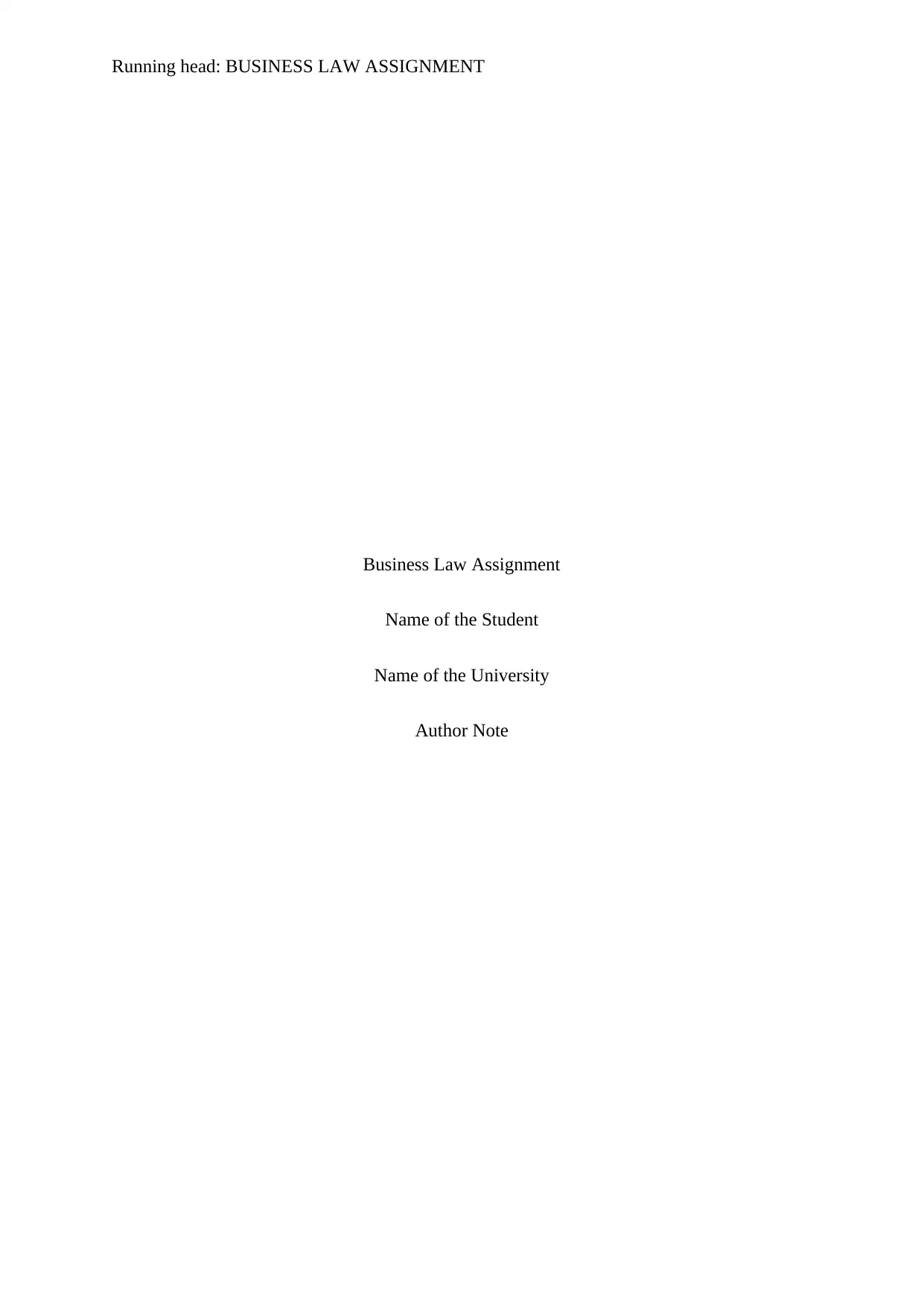
Running head: BUSINESS LAW ASSIGNMENT
Business Law Assignment
Name of the Student
Name of the University
Author Note
Business Law Assignment
Name of the Student
Name of the University
Author Note
Secure Best Marks with AI Grader
Need help grading? Try our AI Grader for instant feedback on your assignments.
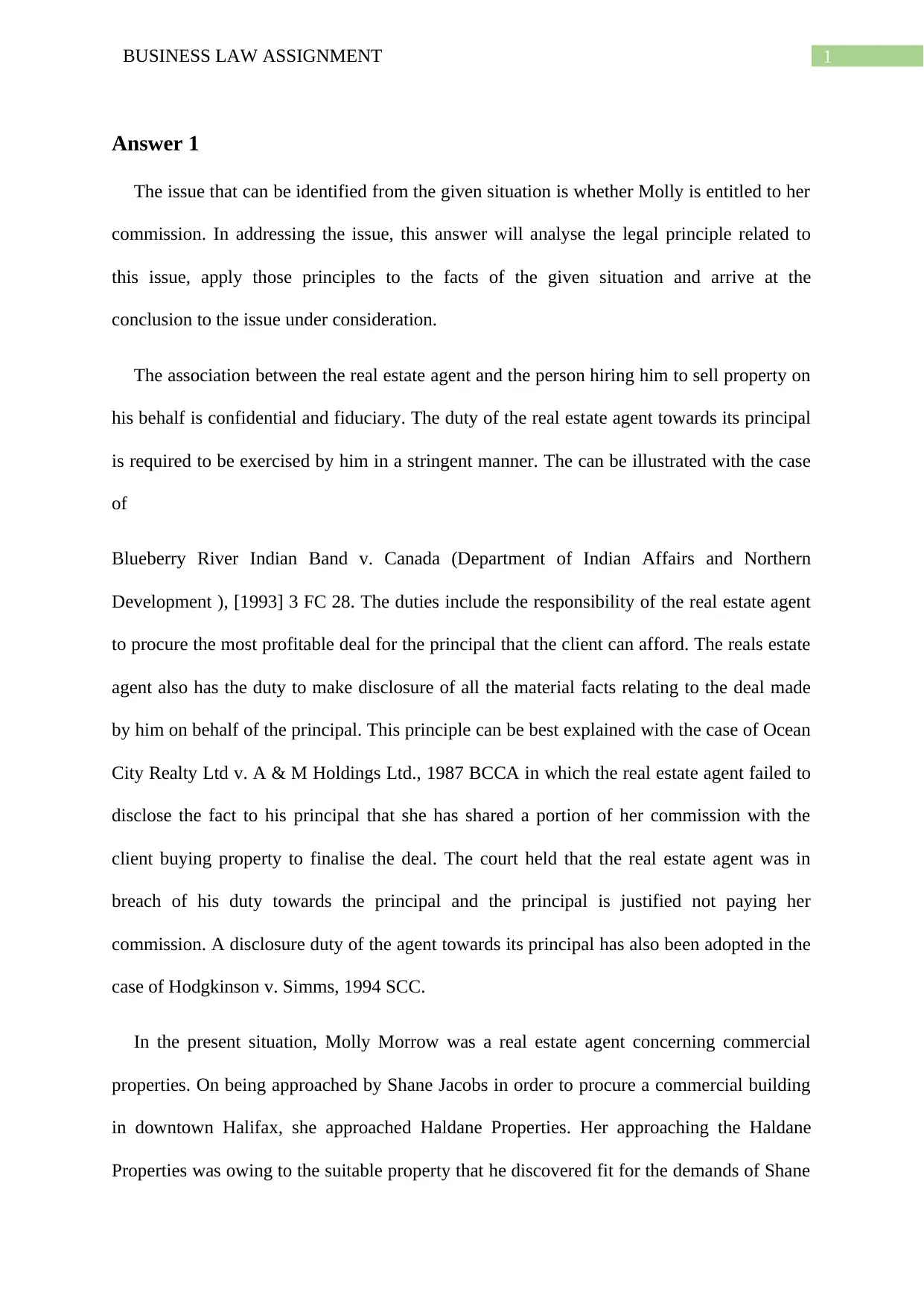
1BUSINESS LAW ASSIGNMENT
Answer 1
The issue that can be identified from the given situation is whether Molly is entitled to her
commission. In addressing the issue, this answer will analyse the legal principle related to
this issue, apply those principles to the facts of the given situation and arrive at the
conclusion to the issue under consideration.
The association between the real estate agent and the person hiring him to sell property on
his behalf is confidential and fiduciary. The duty of the real estate agent towards its principal
is required to be exercised by him in a stringent manner. The can be illustrated with the case
of
Blueberry River Indian Band v. Canada (Department of Indian Affairs and Northern
Development ), [1993] 3 FC 28. The duties include the responsibility of the real estate agent
to procure the most profitable deal for the principal that the client can afford. The reals estate
agent also has the duty to make disclosure of all the material facts relating to the deal made
by him on behalf of the principal. This principle can be best explained with the case of Ocean
City Realty Ltd v. A & M Holdings Ltd., 1987 BCCA in which the real estate agent failed to
disclose the fact to his principal that she has shared a portion of her commission with the
client buying property to finalise the deal. The court held that the real estate agent was in
breach of his duty towards the principal and the principal is justified not paying her
commission. A disclosure duty of the agent towards its principal has also been adopted in the
case of Hodgkinson v. Simms, 1994 SCC.
In the present situation, Molly Morrow was a real estate agent concerning commercial
properties. On being approached by Shane Jacobs in order to procure a commercial building
in downtown Halifax, she approached Haldane Properties. Her approaching the Haldane
Properties was owing to the suitable property that he discovered fit for the demands of Shane
Answer 1
The issue that can be identified from the given situation is whether Molly is entitled to her
commission. In addressing the issue, this answer will analyse the legal principle related to
this issue, apply those principles to the facts of the given situation and arrive at the
conclusion to the issue under consideration.
The association between the real estate agent and the person hiring him to sell property on
his behalf is confidential and fiduciary. The duty of the real estate agent towards its principal
is required to be exercised by him in a stringent manner. The can be illustrated with the case
of
Blueberry River Indian Band v. Canada (Department of Indian Affairs and Northern
Development ), [1993] 3 FC 28. The duties include the responsibility of the real estate agent
to procure the most profitable deal for the principal that the client can afford. The reals estate
agent also has the duty to make disclosure of all the material facts relating to the deal made
by him on behalf of the principal. This principle can be best explained with the case of Ocean
City Realty Ltd v. A & M Holdings Ltd., 1987 BCCA in which the real estate agent failed to
disclose the fact to his principal that she has shared a portion of her commission with the
client buying property to finalise the deal. The court held that the real estate agent was in
breach of his duty towards the principal and the principal is justified not paying her
commission. A disclosure duty of the agent towards its principal has also been adopted in the
case of Hodgkinson v. Simms, 1994 SCC.
In the present situation, Molly Morrow was a real estate agent concerning commercial
properties. On being approached by Shane Jacobs in order to procure a commercial building
in downtown Halifax, she approached Haldane Properties. Her approaching the Haldane
Properties was owing to the suitable property that he discovered fit for the demands of Shane
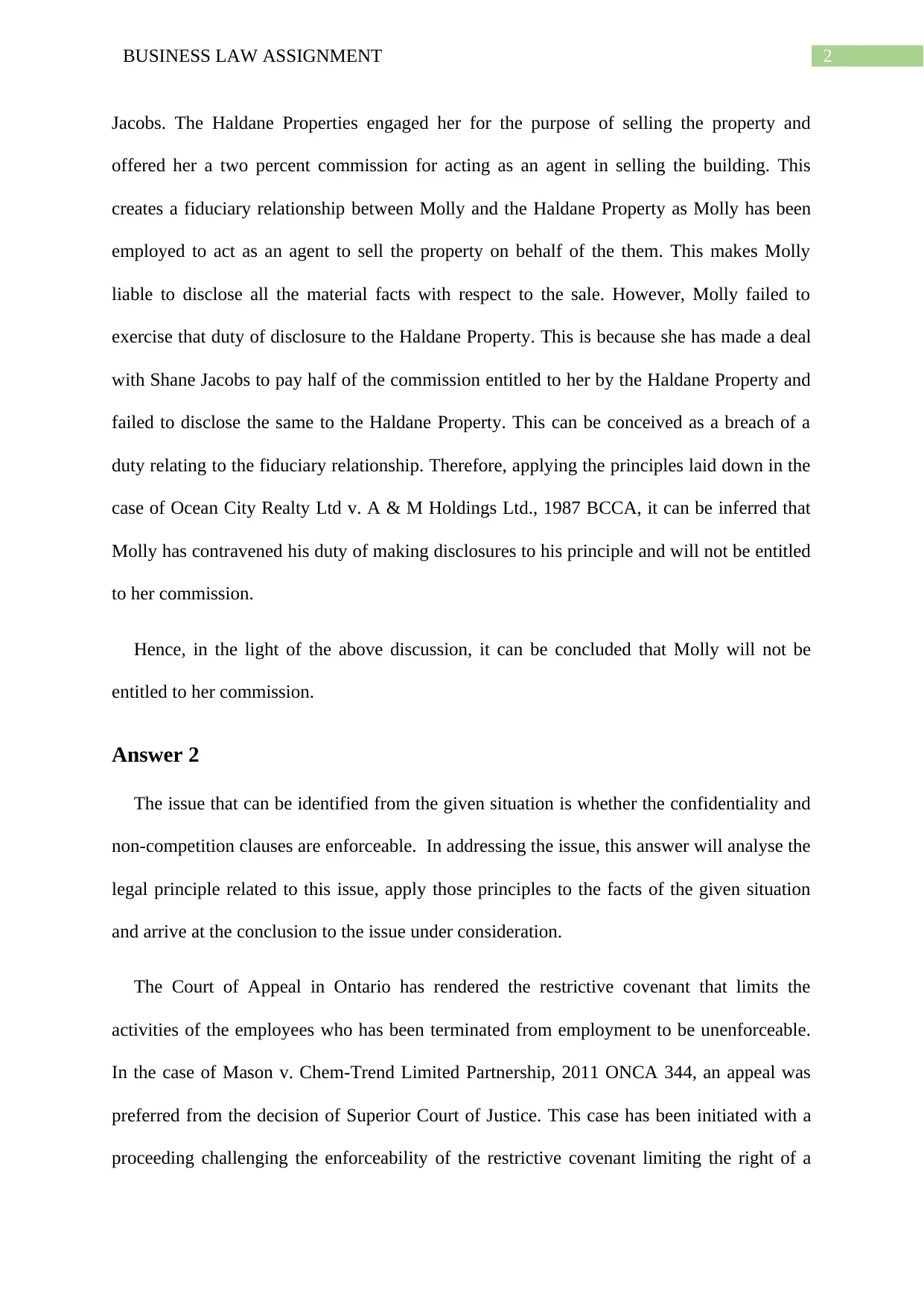
2BUSINESS LAW ASSIGNMENT
Jacobs. The Haldane Properties engaged her for the purpose of selling the property and
offered her a two percent commission for acting as an agent in selling the building. This
creates a fiduciary relationship between Molly and the Haldane Property as Molly has been
employed to act as an agent to sell the property on behalf of the them. This makes Molly
liable to disclose all the material facts with respect to the sale. However, Molly failed to
exercise that duty of disclosure to the Haldane Property. This is because she has made a deal
with Shane Jacobs to pay half of the commission entitled to her by the Haldane Property and
failed to disclose the same to the Haldane Property. This can be conceived as a breach of a
duty relating to the fiduciary relationship. Therefore, applying the principles laid down in the
case of Ocean City Realty Ltd v. A & M Holdings Ltd., 1987 BCCA, it can be inferred that
Molly has contravened his duty of making disclosures to his principle and will not be entitled
to her commission.
Hence, in the light of the above discussion, it can be concluded that Molly will not be
entitled to her commission.
Answer 2
The issue that can be identified from the given situation is whether the confidentiality and
non-competition clauses are enforceable. In addressing the issue, this answer will analyse the
legal principle related to this issue, apply those principles to the facts of the given situation
and arrive at the conclusion to the issue under consideration.
The Court of Appeal in Ontario has rendered the restrictive covenant that limits the
activities of the employees who has been terminated from employment to be unenforceable.
In the case of Mason v. Chem-Trend Limited Partnership, 2011 ONCA 344, an appeal was
preferred from the decision of Superior Court of Justice. This case has been initiated with a
proceeding challenging the enforceability of the restrictive covenant limiting the right of a
Jacobs. The Haldane Properties engaged her for the purpose of selling the property and
offered her a two percent commission for acting as an agent in selling the building. This
creates a fiduciary relationship between Molly and the Haldane Property as Molly has been
employed to act as an agent to sell the property on behalf of the them. This makes Molly
liable to disclose all the material facts with respect to the sale. However, Molly failed to
exercise that duty of disclosure to the Haldane Property. This is because she has made a deal
with Shane Jacobs to pay half of the commission entitled to her by the Haldane Property and
failed to disclose the same to the Haldane Property. This can be conceived as a breach of a
duty relating to the fiduciary relationship. Therefore, applying the principles laid down in the
case of Ocean City Realty Ltd v. A & M Holdings Ltd., 1987 BCCA, it can be inferred that
Molly has contravened his duty of making disclosures to his principle and will not be entitled
to her commission.
Hence, in the light of the above discussion, it can be concluded that Molly will not be
entitled to her commission.
Answer 2
The issue that can be identified from the given situation is whether the confidentiality and
non-competition clauses are enforceable. In addressing the issue, this answer will analyse the
legal principle related to this issue, apply those principles to the facts of the given situation
and arrive at the conclusion to the issue under consideration.
The Court of Appeal in Ontario has rendered the restrictive covenant that limits the
activities of the employees who has been terminated from employment to be unenforceable.
In the case of Mason v. Chem-Trend Limited Partnership, 2011 ONCA 344, an appeal was
preferred from the decision of Superior Court of Justice. This case has been initiated with a
proceeding challenging the enforceability of the restrictive covenant limiting the right of a
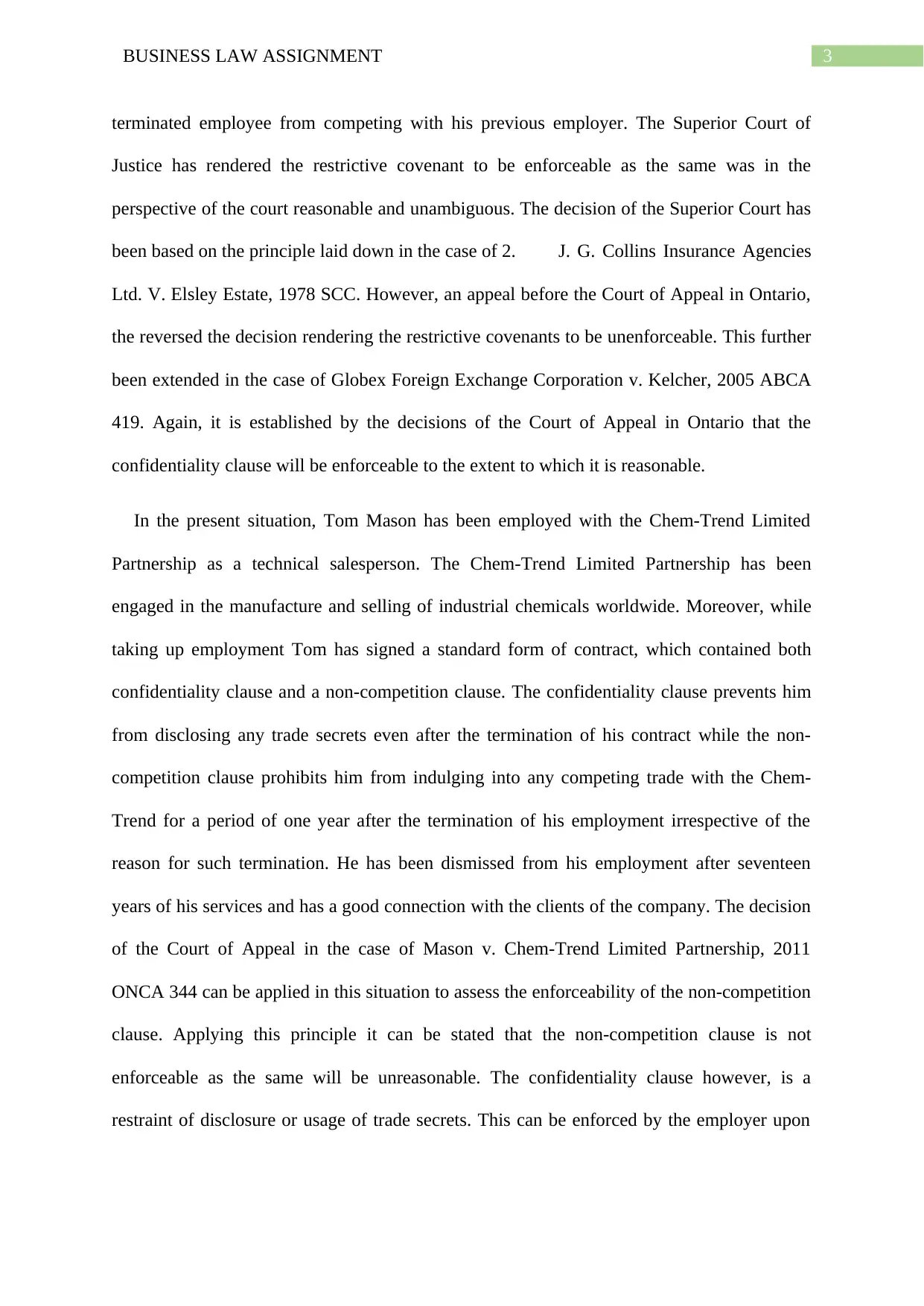
3BUSINESS LAW ASSIGNMENT
terminated employee from competing with his previous employer. The Superior Court of
Justice has rendered the restrictive covenant to be enforceable as the same was in the
perspective of the court reasonable and unambiguous. The decision of the Superior Court has
been based on the principle laid down in the case of 2. J. G. Collins Insurance Agencies
Ltd. V. Elsley Estate, 1978 SCC. However, an appeal before the Court of Appeal in Ontario,
the reversed the decision rendering the restrictive covenants to be unenforceable. This further
been extended in the case of Globex Foreign Exchange Corporation v. Kelcher, 2005 ABCA
419. Again, it is established by the decisions of the Court of Appeal in Ontario that the
confidentiality clause will be enforceable to the extent to which it is reasonable.
In the present situation, Tom Mason has been employed with the Chem-Trend Limited
Partnership as a technical salesperson. The Chem-Trend Limited Partnership has been
engaged in the manufacture and selling of industrial chemicals worldwide. Moreover, while
taking up employment Tom has signed a standard form of contract, which contained both
confidentiality clause and a non-competition clause. The confidentiality clause prevents him
from disclosing any trade secrets even after the termination of his contract while the non-
competition clause prohibits him from indulging into any competing trade with the Chem-
Trend for a period of one year after the termination of his employment irrespective of the
reason for such termination. He has been dismissed from his employment after seventeen
years of his services and has a good connection with the clients of the company. The decision
of the Court of Appeal in the case of Mason v. Chem-Trend Limited Partnership, 2011
ONCA 344 can be applied in this situation to assess the enforceability of the non-competition
clause. Applying this principle it can be stated that the non-competition clause is not
enforceable as the same will be unreasonable. The confidentiality clause however, is a
restraint of disclosure or usage of trade secrets. This can be enforced by the employer upon
terminated employee from competing with his previous employer. The Superior Court of
Justice has rendered the restrictive covenant to be enforceable as the same was in the
perspective of the court reasonable and unambiguous. The decision of the Superior Court has
been based on the principle laid down in the case of 2. J. G. Collins Insurance Agencies
Ltd. V. Elsley Estate, 1978 SCC. However, an appeal before the Court of Appeal in Ontario,
the reversed the decision rendering the restrictive covenants to be unenforceable. This further
been extended in the case of Globex Foreign Exchange Corporation v. Kelcher, 2005 ABCA
419. Again, it is established by the decisions of the Court of Appeal in Ontario that the
confidentiality clause will be enforceable to the extent to which it is reasonable.
In the present situation, Tom Mason has been employed with the Chem-Trend Limited
Partnership as a technical salesperson. The Chem-Trend Limited Partnership has been
engaged in the manufacture and selling of industrial chemicals worldwide. Moreover, while
taking up employment Tom has signed a standard form of contract, which contained both
confidentiality clause and a non-competition clause. The confidentiality clause prevents him
from disclosing any trade secrets even after the termination of his contract while the non-
competition clause prohibits him from indulging into any competing trade with the Chem-
Trend for a period of one year after the termination of his employment irrespective of the
reason for such termination. He has been dismissed from his employment after seventeen
years of his services and has a good connection with the clients of the company. The decision
of the Court of Appeal in the case of Mason v. Chem-Trend Limited Partnership, 2011
ONCA 344 can be applied in this situation to assess the enforceability of the non-competition
clause. Applying this principle it can be stated that the non-competition clause is not
enforceable as the same will be unreasonable. The confidentiality clause however, is a
restraint of disclosure or usage of trade secrets. This can be enforced by the employer upon
Secure Best Marks with AI Grader
Need help grading? Try our AI Grader for instant feedback on your assignments.
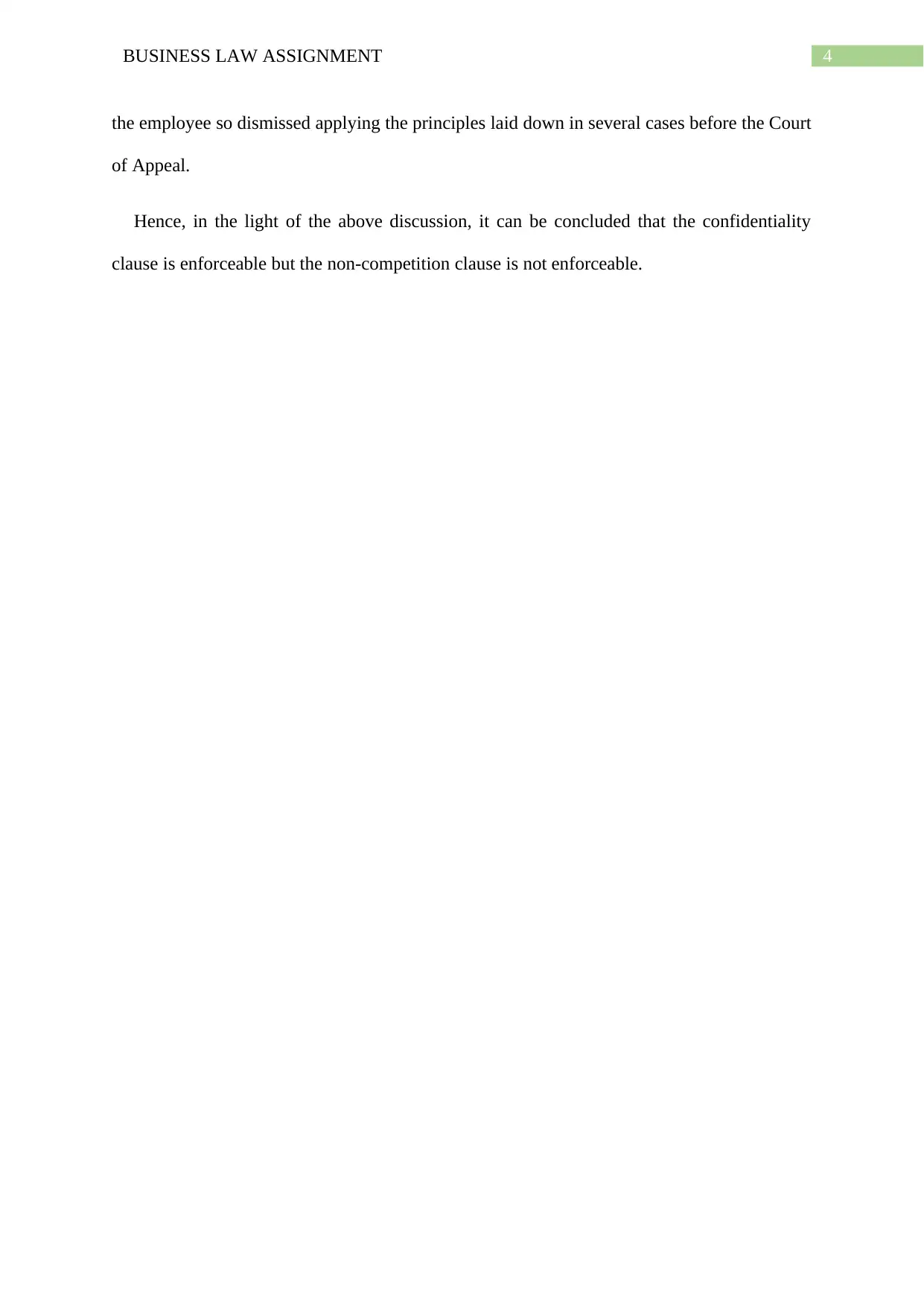
4BUSINESS LAW ASSIGNMENT
the employee so dismissed applying the principles laid down in several cases before the Court
of Appeal.
Hence, in the light of the above discussion, it can be concluded that the confidentiality
clause is enforceable but the non-competition clause is not enforceable.
the employee so dismissed applying the principles laid down in several cases before the Court
of Appeal.
Hence, in the light of the above discussion, it can be concluded that the confidentiality
clause is enforceable but the non-competition clause is not enforceable.
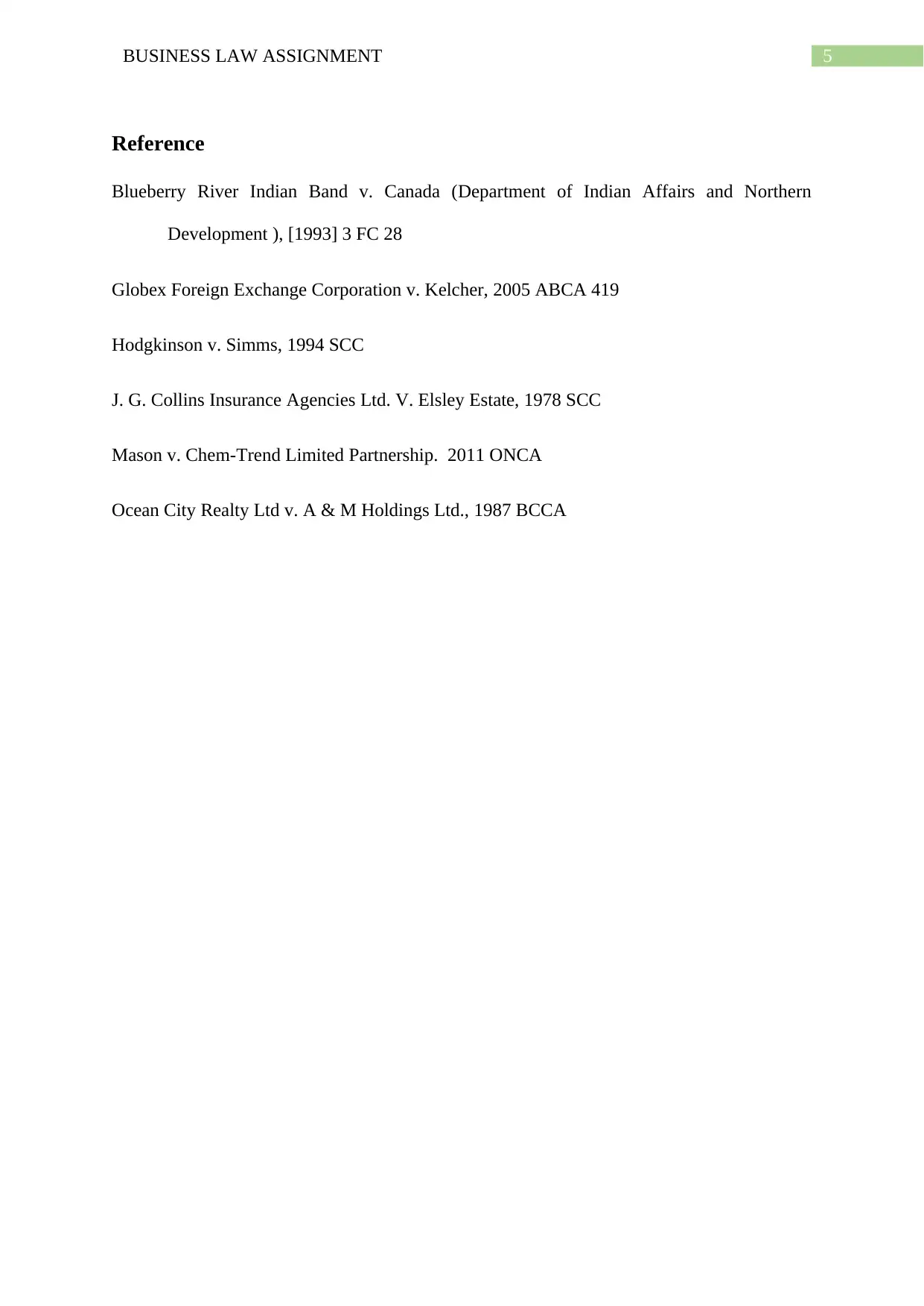
5BUSINESS LAW ASSIGNMENT
Reference
Blueberry River Indian Band v. Canada (Department of Indian Affairs and Northern
Development ), [1993] 3 FC 28
Globex Foreign Exchange Corporation v. Kelcher, 2005 ABCA 419
Hodgkinson v. Simms, 1994 SCC
J. G. Collins Insurance Agencies Ltd. V. Elsley Estate, 1978 SCC
Mason v. Chem-Trend Limited Partnership. 2011 ONCA
Ocean City Realty Ltd v. A & M Holdings Ltd., 1987 BCCA
Reference
Blueberry River Indian Band v. Canada (Department of Indian Affairs and Northern
Development ), [1993] 3 FC 28
Globex Foreign Exchange Corporation v. Kelcher, 2005 ABCA 419
Hodgkinson v. Simms, 1994 SCC
J. G. Collins Insurance Agencies Ltd. V. Elsley Estate, 1978 SCC
Mason v. Chem-Trend Limited Partnership. 2011 ONCA
Ocean City Realty Ltd v. A & M Holdings Ltd., 1987 BCCA
1 out of 6
Related Documents
Your All-in-One AI-Powered Toolkit for Academic Success.
+13062052269
info@desklib.com
Available 24*7 on WhatsApp / Email
![[object Object]](/_next/static/media/star-bottom.7253800d.svg)
Unlock your academic potential
© 2024 | Zucol Services PVT LTD | All rights reserved.





